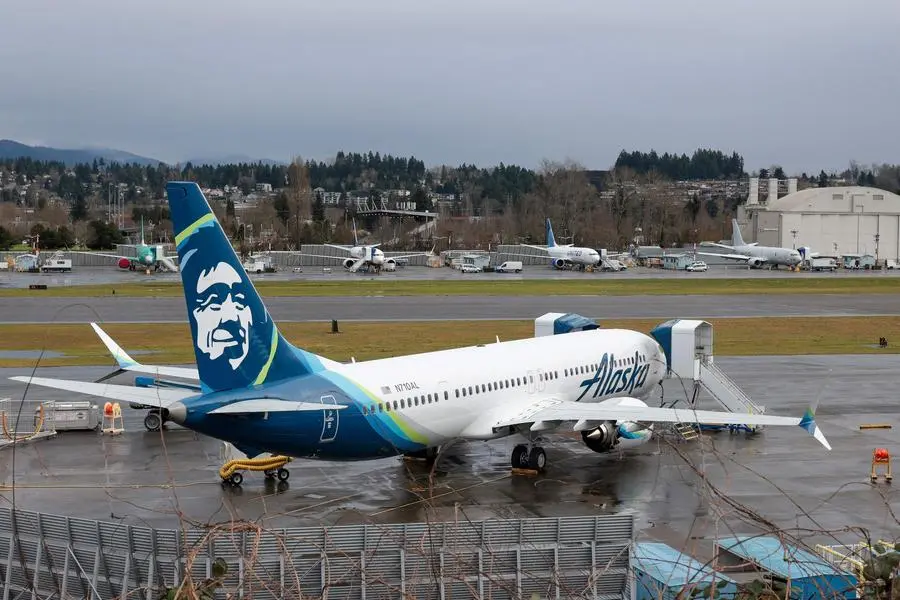PHOTO
Boeing's 737 MAX 9 planes have begun to fly again after the January 5 Alaska Airlines scare, but the episode is expected to weigh on the aviation giant's finances for the foreseeable future.
Both Alaska and United Airlines resumed service on the MAX 9 over the weekend following a three-week grounding after a panel blowout necessitated an emergency landing. The incident has heaped scrutiny on Boeing and CEO David Calhoun.
Investors will get an initial appraisal of the financial consequences on Wednesday when Boeing releases fourth-quarter results.
Besides reporting another annual loss, Boeing is expected to withdraw commercial plane production targets that have been central to its medium-term financial outlook, which has included promises for much profitability in 2025 and 2026.
The Alaska Airlines episode is also expected to add to costs, including compensation for airlines. However, these items may not surface until later in 2024, analysts said.
Shares of Boeing have fallen nearly 18 percent since the troubled Alaska Airlines flight as investors bet on a toughened regulatory environment that slows plane deliveries.
Bank of America analysts downgraded Boeing this week, concluding that "materially increased regulatory scrutiny" from the Federal Aviation Administration (FAA) would result in a "forced slowdown."
The incident has also added to questions about Boeing leadership in light of sharp criticism of the company from airline customers.
Calhoun spent part of last week on Capitol Hill meeting with lawmakers who have also promised public hearings.
"They're going to have to demonstrate change," said Jeff Guzzetti, a former head of the FAA's investigation division.
Guzzetti said he expects management changes, but added, "I don't know what that looks like or who."
- Ongoing probe -
The Alaska Airlines episode represents the most serious operational problem for Boeing since two crashes on 737 MAX 8 planes in 2018 and 2019 resulted in 346 fatalities and a lengthy grounding.
While there were no serious injuries in the latest incident, National Transportation Safety Board officials have said the episode could have been catastrophic.
The agency is expected to update the probe next week, an NTSB spokesperson said Friday.
The FAA has pointedly criticized Boeing's quality assurances as "unacceptable" in not identifying manufacturing problems prior to the delivery to customers.
Analysts don't expect Boeing to disclose findings about the root causes of the January incident when it reports earnings Wednesday, but are hopeful for more details about the company's operational changes.
Morningstar analyst Nicolas Owens is looking for "any incremental information about what they're going to do differently," he said in an interview.
"They have not dug deep enough into how disrupted their manufacturing process has become. And they need to dig deeper," he told AFP.
- Production targets doubtful -
The MAX 9 planes are beginning to return to service after the FAA last week cleared the jets following detailed inspections.
But as part of its MAX 9 announcement, the FAA froze Boeing's production level for the model until the company demonstrates improvement.
That halt likely derails Boeing's plans to lift MAX production from its 2023 target of around 38 per month to 50 per month in 2025 or 2026 -- a boost it hoped would result in $10 billion in free cash flow.
Analysts have also noted that the higher output levels had assumed timely FAA certification -- which might now be delayed -- of the 737 MAX 7 and the 737 MAX 10.
"Boeing is going to have a problem with expediting deliveries of their new aircraft," said Guzzetti, who warned of "profit loss" from the constraints.
Christopher Raite, a senior analyst at Third Bridge, said Boeing's dive in the stock market reflects investor "pessimism" about its ability to ramp up MAX output.
"We want to hear what they plan to produce, at what rate and when they plan to get there," Raite said. "Are they going to move that 2025 target?"
The crisis facing Boeing has sparked speculation about a leadership change, potentially including Calhoun.
Airlines executives in recent weeks have sharply criticized Boeing and demanded stricter oversight while stopping short of calling for leadership changes.
A board member since 2009, Calhoun ascended to the top job following the December 2019 ouster of Dennis Muilenburg in the wake of the two fatal MAX crashes.
In 2021, Boeing raised the retirement age for its CEOs to 70, potentially enabling Calhoun to remain in place until 2028. In December, the company named Stephanie Pope as chief operating officer, a move seen as possibly setting up a successor.
Morningstar's Owens does not expect a management change, however, at least while Boeing is still in "crisis mode."




















